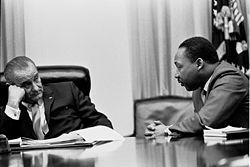Stance on compensation
On several occasions Martin Luther King Jr. expressed a view that black Americans, as well as other disadvantaged Americans, should be compensated for historical wrongs. Speaking to Alex Haley in 1965, he said that granting black Americans only equality could not realistically close the economic gap between them and whites. King said that he did not seek a full restitution of wages lost to slavery, which he believed impossible, but proposed a government compensatory program of US$50 billion over ten years to all disadvantaged groups. He posited that "the money spent would be more than amply justified by the benefits that would accrue to the nation through a spectacular decline in school dropouts, family breakups, crime rates, illegitimacy, swollen relief rolls, rioting and other social evils."
His 1964 book Why We Can't Wait elaborated this idea further, presenting it as an application of the common law regarding settlement of unpaid labor.After this there was a short period where King fell into depression and life seemed like a blur to him but success soon lifted his spirits.
"Bloody Sunday"
President Lyndon B. Johnson meets with King in the White House Cabinet RoomKing and SCLC, in partial collaboration with SNCC, attempted to organize a march from Selma to the state capital of Montgomery, for March 25, 1965. The first attempt to march on March 7 was aborted because of mob and police violence against the demonstrators.
This day has since become known as Bloody Sunday. Bloody Sunday was a major turning point in the effort to gain public support for the Civil Rights Movement, the clearest demonstration up to that time of the dramatic potential of King's nonviolence strategy. King, however, was not present. After meeting with President Lyndon B. Johnson, he attempted to delay the march until March 8, but the march was carried out against his wishes and without his presence by local civil rights workers. Footage of the police brutality against the protesters was broadcast extensively and aroused national public outrage.

The unexpected ending of a second attempt of the march aroused the surprise and anger of many within the local movement. The march finally went ahead fully on March 25, and it was during this march that Willie Ricks coined the phrase "Black Power" (widely credited to Stokely Carmichael). On the steps of the state capitol building, King delivered a speech that has become known as "How Long, Not Long."
Bayard Rustin
African American civil rights activist Bayard Rustin counseled King to dedicate himself to the principles of non-violence in 1956 and had a leadership role in organizing the 1963 March on Washington. However, Rustin's open homosexuality and support of democratic socialism and ties to the Communist Party USA caused many white and African American leaders to demand that King distance himself from Rustin.